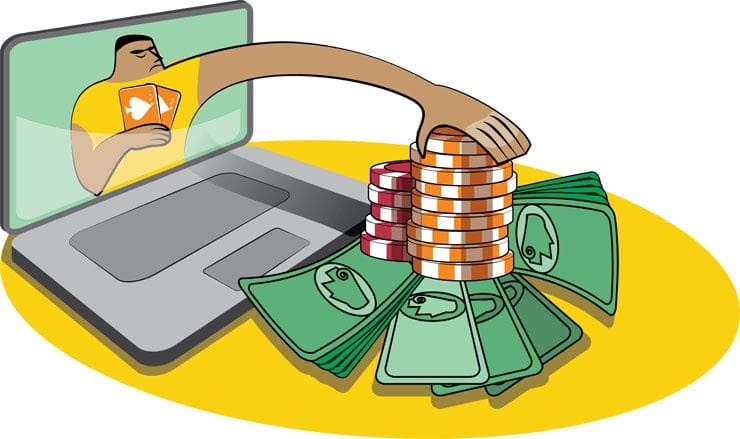
Have you ever lost more than you should have at online poker?
Of course you have. If you claim you haven’t, you’re either:
- Married and you don’t have to show your spouse the credit card statements, or
- Russ Hamilton, in which case I hope you find your karmic home one day in the back of a prison cell.
You aren’t alone.
I’ve heard from decent poker-enthusiast statisticians over the years who claim that 90% or more of players to ever sit down at a table are one-time losers who never come back or long-term losers who never get better.
I’ve been there.
Even though I eventually got to the point where I could earn a decent living or supplement my main income through poker winnings it wasn’t always that way.
Table of Contents
- 18 months of losing
- If 90% are losers who do you want to be?
- The First Step
- #1. You don’t know enough about the only two stats that really matter
- #2. You aren’t choosing the right tables
- #3. Do you still have a pulse on the right strategy for today’s games?
- #4. Your poker knowledge may have serious flaws
- #5. You aren’t setting limits for your gameplay
- #6. You pick your playing time poorly
- #7. You’ve made online poker your ritual, even if you don’t feel like it
- #8. You add in too many distractions
- #9. Taking your rent money to the virtual cashier
- #10. You take premature shots at bigger games
- #11. You’re playing too many (or too few) tables at once
- Still not sure why you’re losing money at online poker?
- Don’t get discouraged by short-term results
18 months of losing
When I first started playing online poker in the heart of the poker boom I had my fair share of losses.
Okay, more than my fair share. 172 losing sessions in the first 18 months, to be exact.
Sometimes it may have been $1, sometimes it may have been $100, but they were all losing sessions.
Despite those 172 losses, I remained confident that I could still use some elusive form of alchemy to turn that ugly red negative balance next to my game record notepad into a fat black one.
Making money on my own terms from home simply by making the right decisions more often than not? I wasn’t going anywhere, sofa stuffing integrity and TV-tray/laptop stand paint be damned!
Over time, I learned that the magic formula to winning wasn’t so magical. It was simply to stop repeating the mistakes I wasn’t honest with myself about.
I eventually became a consistent winner by eliminating leaks and gaining more experience. Believe me, if I never turned that corner I would have at least been smart enough to cut myself off.
If 90% are losers who do you want to be?

All I need you to do to start is be honest with yourself.
Do any of the following apply to you?
If so, I challenge you to eliminate just one from your game at your next session.
Before you know it your significant other’s going to be saying:
“Wow, honey, those charges for Chinese sporting goods really dried up this month! And why is Fedex delivering an envelope every week from Antigua all of the sudden? And have you been working out? Because you look like a real winner.”
That, my friend, is when you’ve officially become the other 10%.
The First Step
The first step to becoming a winner is to identify why you’re losing.
I’m going to share the 11 most significant reasons I was losing.
I’ve heard these echoed time and time again over the last decade by other frustrated poker players as well.
We’re all desperate to see those virtual chips stacking in front of our own seat rather than “LOLboogerman69” to our left.
#1. You don’t know enough about the only two stats that really matter
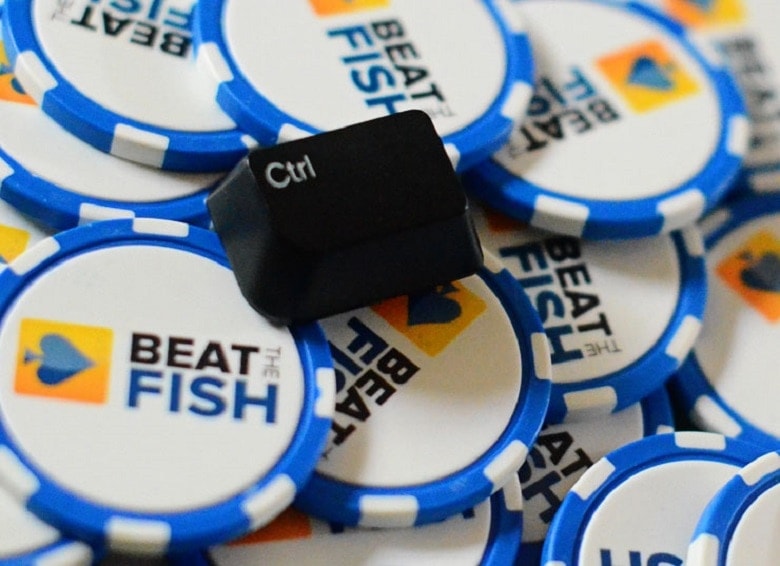
Newbies just learning the game and those who have never played often think that poker is all about math.
“The pros must be able to figure out complex equations in their heads in seconds.”
“If you aren’t good at math then you just don’t stand much of a chance at poker.”
That’s all completely false and needlessly intimidating.
What I tell new players is to throw out every math concept except for two: pot odds and the most common drawing odds.
After you’ve developed a decent by-the-book standard for starting hand truly focus on those two concepts alone and master them before you add anything else to your game.
Most low-stakes online poker players don’t make the statistically-correct decisions for their hand in relation to the pot odds they’re receiving.
If you do you’re already playing better than most of your opponents. The product of that equation is easy for anyone to figure out.
Relying on implied odds and card memory
Personal example: I used to rely on “implied odds” – you know, that beautiful abstract concept that you’re just guaranteed to bust your opponent if that bad draw does hit – to convince myself that a bad move was okay rather than just play the real pot odds. Or how about when you’ve convinced that those bits and bytes actually have a memory? “I haven’t flopped a set the last dozen tries so the cards are due for it this time… Whoops.”
Pot odds compared to the odds of your hand (or your opponent’s) improving
After you can choose your starting hands on autopilot you simply need more practice comparing the odds the pot is offering you to the odds your hand has of improving. You also need to learn how to size your own bets properly to give your opponents the wrong odds to draw out on you.
I’m convinced that having an excellent grasp of those two concepts is all it will take for many losing players to turn things around.
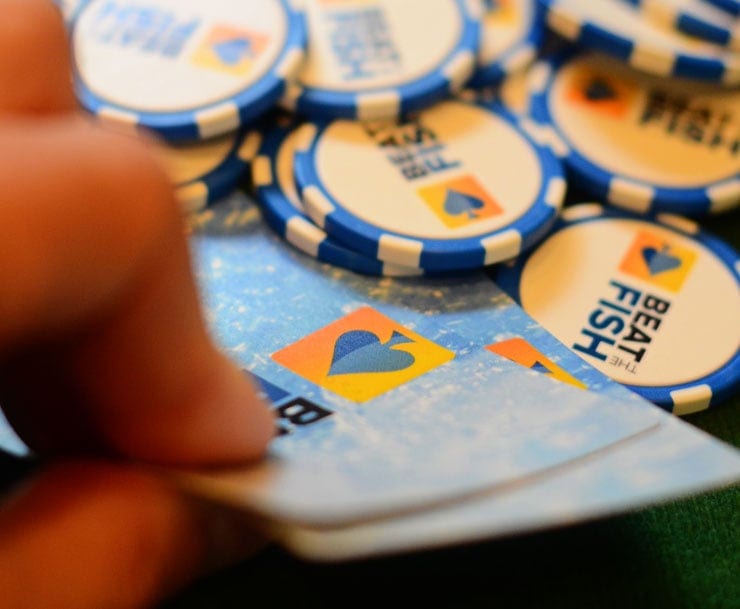
#2. You aren’t choosing the right tables
If you aren’t looking at the individual poker table statistics before you open it you’re putting yourself at a needless disadvantage. The two key numbers you’re looking for are average players per flop and average pot percentage. They’re the 2 best ways to get an idea of what a table is playing like without actually sitting and observing it. Most players will want these numbers as high as possible.
You likely prefer the tight-aggressive style, which certainly can be a profitable style. It’s what most traditional strategy books recommend and it’s a straightforward solid way to play that rewards patience and strength.
Don’t look for opponents who play like you do
One of the simplest, but most effective mantras of poker strategy to follow is to play the opposite style of your opponents.
You don’t want to sit down with a table full of other tight nits that give a whole new meaning to the term “quick fold”. There are no guaranteed loose poker sites anymore, with most tables literally wound inside the Gordian knot. Don’t get on the waiting list simply for the limit you want. Select individual tables that are trending towards giving action.
Personal example: As I started playing online poker during the halcyon early-to-mid 2000s The Great Tightening of the past several years has felt like trading in a Ferrari for a Yugo. I did used to be able to simply get into a game as quickly as possible by waiting for the first table available at the given stakes. Those days are gone. 25% flop percentage is the new black.
Which specific table stats to look for
This is a very very easy routine to add to your game. Simply look at the stats the poker software gives you and choose your potential tables accordingly. You don’t want to touch an iron-fisted game with a flop percentage under 20% and an average pot of 12-15x the big blind.
They’re likely full of players as tight as you are who only will give you action when they have you beaten. You’ll also get so bored of watching everyone fold to the big blind that you’ll probably make some dumb plays just to reanimate the zombies sitting across from you.
There’s a reason the longest waiting lists are for tables with high flop percentages and average pots. It’s going to take you longer to get a seat, but it will be worth the wait to join the party instead of the funeral.
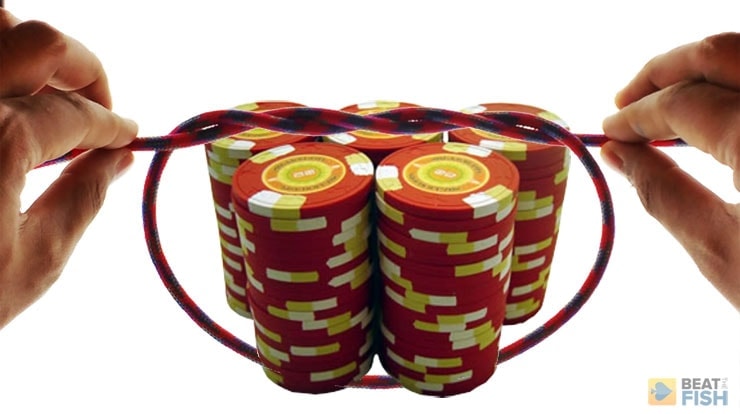
#3. Do you still have a pulse on the right strategy for today’s games?
This reason may not be completely clear to those new to online poker, but players who have been around the block for a while should understand it. You used to be a winner in the games a couple of years ago, but now it seems like you are the fish at the tables.
The simple truth is that the game is changing rapidly and the progress curve of an average player is truly incredible. With more and more resources available for free or at a low price, everyone hungry to learn can find their fix.
If you aren’t keeping up the pace you’re going to fall behind. It’s as simple as that. You have to be aware of some of the latest trends in online poker if you want to be a winner.
Personal example: I watched firsthand the deterioration of online poker games from fish-filled souffles to overcooked stew meat. The combination of poker baby boomers getting years of experience, freely available high-quality strategy, and the US government taking all the fun and payment processors away largely dried up the well.
The same style of play isn’t optimal for every era
If you play poker over a long period of time, realize that the game has trends that you need to be aware of. Prior to the poker boom of the early-2000s most Texas Hold’em games were incredibly tight overall. It’s why old-time legends like Stu Ungar and Doyle Brunson could largely run over their tight tablemates with an aggressive style. Then seemingly everyone played that way during the poker boom.
The last 5-8 years have seen things swing back the other way. You need to make adjustments instead of blindly repeating your old standby tricks.
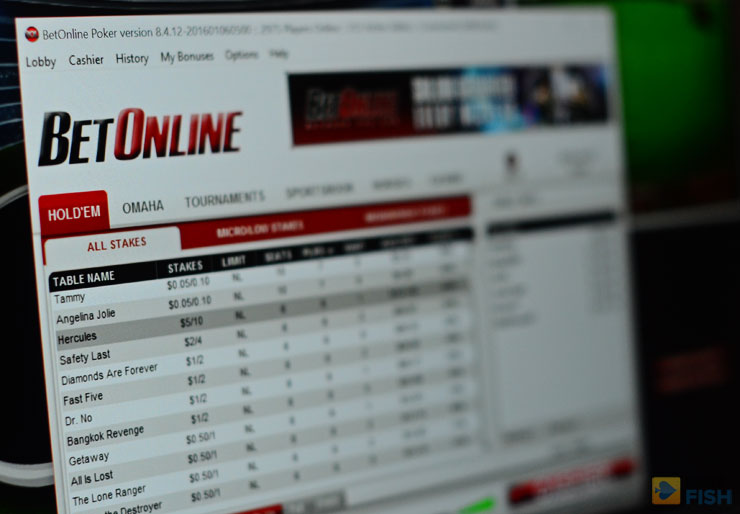
#4. Your poker knowledge may have serious flaws
Theoretical background is usually quite high on the list of reasons why you’re losing at online poker. While you may think and feel that your poker theory is solid you might have flaws that you aren’t even aware of.
This is not only true for online poker, but for poker in general. However, online you get to play many more hands during the same period you would live so strategy holes become magnified. If you’re losing and can’t pinpoint the reasons why, it may be time to go back to the drawing board and check your fundamentals.
You could pick up (or re-pick up) one of an absurdly-high number of poker books or go through my in-depth poker strategy section for starters.
Personal example: I’m not exactly proud of it, but I remember being stumped by rare situations that would arise in my earliest real-money Limit (yes, it really did used to exist) Hold’em games. Why did I lose that pot when I had Aces and Deuces and all he has is Ace-King even though there’s a pair of Fours on the board? And why did we split that pot when I’ve got pocket Queens and he has pocket Treys? Psssst… the board was A-A-A-A-K.
How to stabilize your strategy foundation
Those hands are good for a laugh now, but, at the risk of stating the obvious, you aren’t going to stop losing at online poker if you don’t have a very good understanding of the rules, terms, and overall strategy. I’d like to think my poker strategy section covers a pretty broad range of what you need to know, but of course you could pick up a basic poker strategy book.
Play money games may be where fun goes to die, but I can’t think of a better way to hone your rules of what-beats-what with half of the table all-in on every hand.
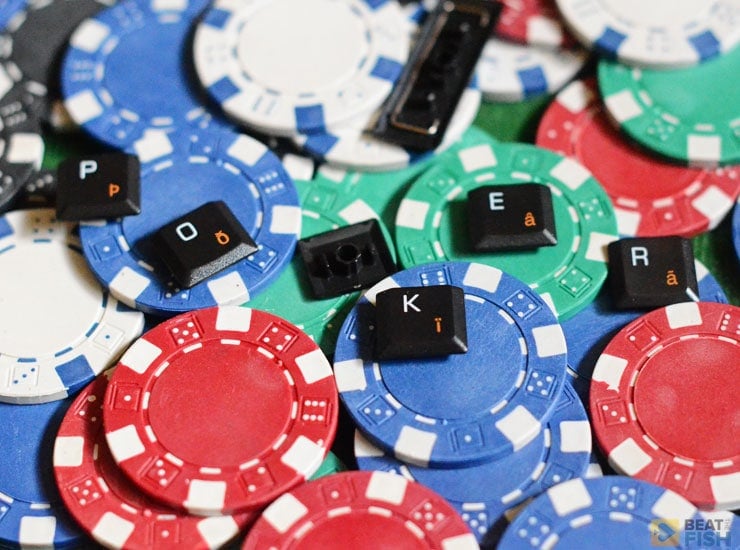
#5. You aren’t setting limits for your gameplay
As with any online game online poker offers players an endless supply of games always around the corner. Regardless of whether you are winning or losing, you will often end up prolonging your session for “another ten minutes” or “until the big blind hits me”. These minutes quickly add up and you end up playing way longer than you planned.
Prolonging your (often-losing) online poker session beyond your physical or mental capacity will almost always have a negative impact on your game. You will start feeling nervous, annoyed at people because they’re taking too long to act, and angry at yourself for not quitting while you were ahead.
Personal example: Oh, I was absolutely guilty of this regularly. I may have joined the land of the living since then, but the old rule for my wife and I used to be we would have to beat the sunrise to bed. I couldn’t stand to go to bed losing so sometimes I wouldn’t keep that rule. One bad beat later and the laptop was rage-closed while I could feel the blood pounding through my arteries.
The biggest disadvantage of online poker
I’ve always thought this was the number one underrated disadvantage of playing online poker. The mechanics of the game dictate you using a device that can perform limitless online activities. The nature of the game is to wait and wait and wait until you have something decent to play. At a real brick-and-mortar table there’s so much more physical and mental stimulation to keep your attention on the game.
Set a time limit, a stop-loss limit, or even a stop-win limit and stop losing money
You need to have control over your poker playing habits. Before you sit down to play, figure out how much time you want to spend playing and once that time is up, quit. Even if you feel like playing more, just quit. You can set a longer period for your next session, but you will avoid endless sessions that wear you down and make you sick to your stomach.
If you aren’t very good with planning there are even computer programs that can help you with time management or simply set an alert on your phone for a pre-programmed stop time. This can be extremely tough to do, but you’ll be healthier and thus win more as a result.
In a perfect world I would advise you to simply watch the game(s) you’re in even if you don’t have any cards, but you can’t do that. I can’t do that, either. You’re going to do something else with your computer/tablet/phone so why not enter a garbage freeroll or penny-stakes table to fill the rest of your attention reservoir? You can also be reading a CardPlayer or a poker book to really be clever. Productive down time FTW.
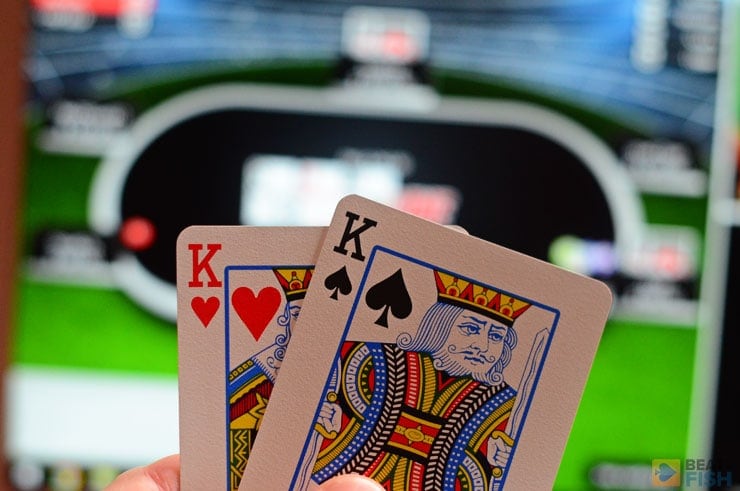
#6. You pick your playing time poorly
One of the wonderful things about online poker is that you can play whenever you feel like. However, this can be a double-edged sword if you aren’t careful.
First of all, there are general times when games are softer. The exact hours may vary depending on your poker platform of choice, but you should try your best to find the times when the most fish are around, eagerly awaiting to donate their money. Check the table statistics in the lobby for the highest flop percentages and average pots to find specific tables that are trending softer.
Don’t play a few quick hands unless you can deal with the fallout
Personal example: This happened to me just recently. Before going out to dinner I was showing a friend how awesome it was to play quick-fold poker from my phone. I was just playing a few example hands at NL$100 to show him how it worked and wound up getting pocket Kings. Okay, I’ve got to play this quickly.
Raised it big pre-flop in position, one limper from early position called me. We ended up all-in on a low ragged flop and he’s got a small set. There goes $100 and I’m annoyed for a while until I can play again to make it back. The lesson? If you’re like me you may want not want to get involved with mini-sessions before you can’t play for a while.
What are the actual hours that games are the softest?
There’s a personal and an overall component to this. On a personal level, you should play during the hours of the day you’re the most alert and confident. This may be the middle of the day on a lazy weekend after you’ve had the chance to sleep on, or on a typical weeknight it could be after dinner and the kids have gone to bed. I believe that whenever you feel most confident in your abilities trumps however the general masses are playing.
However, the greatest diversity in skill level and thus ability to find softer tables, will be during a poker site’s peak hours. For US-facing sites that’s going to be the late afternoon to mid-evening Eastern time. The same goes for the European sites, only that will center around GMT. Who is going to sit at a NL$1,000 heads-up table at 2 A.M. on a Tuesday morning? Probably a nocturnal vampire grinder. Who wants to mess with them?
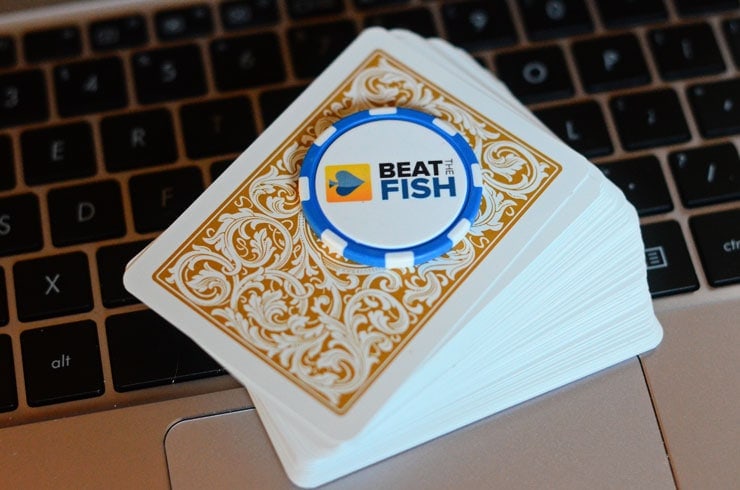
#7. You’ve made online poker your ritual, even if you don’t feel like it
Secondly, people often sit down to play online poker because they have nothing better to do. It is perfectly fine to treat online poker as a hobby, but if you want to be a winner it takes more than just sitting down and firing up the software client.
You need to make sure that your head is in the right place before you start playing. If you are tired, preoccupied, intoxicated, or distracted, this is bound to have an effect on your game. You’d be better off skipping the session altogether if you aren’t feeling positive about playing.
Personal example: My OG now-75 year old poker mentor used to bring his laptop over for marathon online poker sessions while my wife and I were watching movies. Of course, we would be discussing every hand he played. My wife heard some interesting stories. “Back in 1975…pocketjacksonbodog…” It was our ritual.
Evaluate your current state of mind rather than play as a routine
I don’t think there’s anything wrong with making online poker your nightly ritual so long as you’re actually winning once in a while to make up for the losses. There are few experiences that quite match the feeling of being all-in and simply having to wait for a curse-inducing suck out or the gratification of knowing you were paid off for your skills. Of course you want to keep coming back, getting better, and experience that feeling again.
Are you really feeling up for it tonight, though? Did you have a bad day at work or a fight with your significant other? Would the chance of losing your bankroll be the best choice for your mental health? Come back fresh another time and break the routine. You can’t binge-watch The Brady Bunch if you’re donking off your chips at 4 tables.
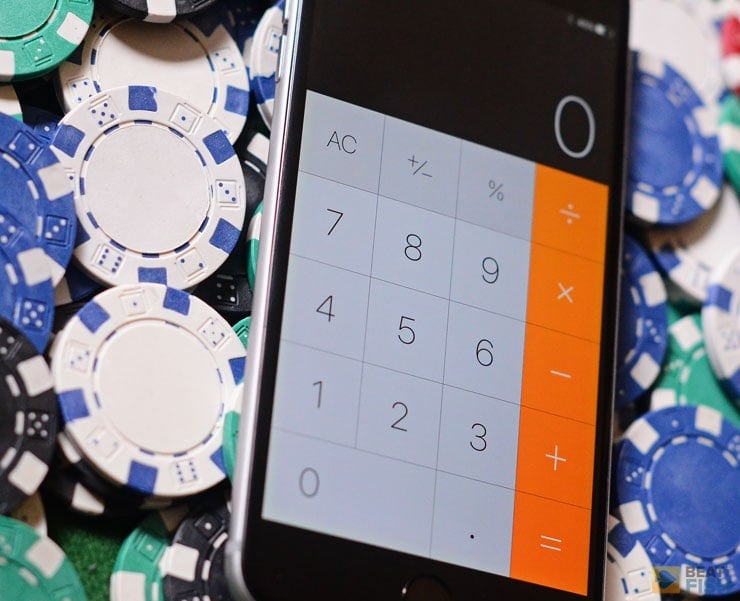
#8. You add in too many distractions
You’re probably reading this article about the reasons why you are losing at online poker while listening to music and chatting someone up on Facebook or Skype. This is fine with me, as I don’t require your full undivided attention, but online poker isn’t as forgiving.
Playing online poker comes with an inherent risk from all sorts of distractions. From chats and emails to funny articles and YouTube videos, distractions will be coming at you from all sides simply because you’re connected to the Internet. You need to fight them off and stay focused on the tables.
Once again, you don’t have to do it if you don’t mind losing money at online poker, but winners are winners for a reason. If your attention is divided between too many things it is likely that your decision-making process at the tables will suffer.
Personal example: Did you know you could play Doom on Windows Mobile? The frame rate is up to 5 fps and to move all you have to do is click this little brushed aluminum click wheel that feels like it’s slicing your finger open. Oh, fine, pocket Aces. I’ll pause it just this once, but I just got the BFG so I’m not going to for long.
How to create distractions that will actually help your game
The perfect storm is if you truly love the game and can’t gobble up enough coverage of it. Reading about poker, watching poker TV shows, surfing the poker section of the interwebs, incessantly searching for any small tidbit that will help your game. Your distractions between hands aren’t really distractions at all because you’re still learning about poker.
For the rest of you jaded jackals? Quick-fold poker is going to seem like a godsend. Most poker sites offer it these days and, with no waiting time before you’re whisked off to another hand, your brain has no time to switch to your web browser to read about the top 10 ’80s kid actors who pursue organic farming in Siberia. You won’t believe #2!
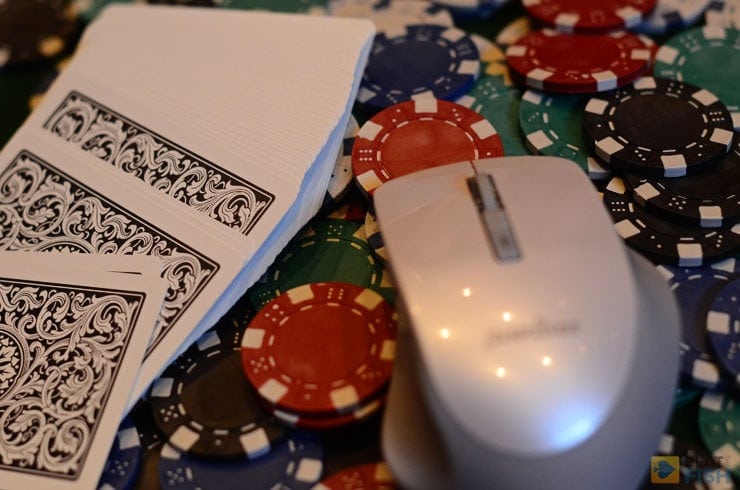
#9. Taking your rent money to the virtual cashier
The anonymity of online environments can be both a blessing and a curse. While you stay protected by your online handle from harmful influences it also gives you more liberty to do things you wouldn’t otherwise and avoid immediate judgment.
Many people simply play well beyond their limits when they play online poker. It only takes a few clicks to send the money from your credit card to the operator and a few clicks more to get that money on the table. This is incredibly convenient, but can also be a curse for irresponsible players.
Scared money
Once you start losing money at online poker and you’re playing above what you can afford there is no way you can keep playing good poker. You’ve heard the expression “scared money” more than once, and you don’t want to be the scared money at the table. Play only at the limits where you feel comfortable and it will help you play much better.
Personal example: I have to say that this one didn’t hit me personally, but I’ve heard from plenty of players who weren’t as fortunate. While I may have lost 172 times I wasn’t making excessive deposits constantly. I was playing with what I could afford to lose.
Don’t play with more than you can afford to lose
Borrowing a phrase often used in the stock market, “only invest what you can afford to lose.” Besides the obvious self-destructive poor decision-making if you’re playing with rent, food, or mortgage money you simply aren’t going to be completely focused on the game. You know how awful it’s going to be if you lose, which is where that pit in your stomach comes from.
I haven’t seen it happen often, but it’s always literally pained me to see everyday losing players sink exorbitant amounts into the game. Sure, we need the fish to keep the poker ecosystem healthy, but I’ll take 10 recs donating a little over one down-and-out guy going broke any day.
#10. You take premature shots at bigger games
Taking shots is another common reason why you may be losing at online poker. This is not quite the same as playing above your limits, but it is in a similar ballpark.
Say your usual online poker game is NL25 ($0.10/$0.25 blinds) and you’re a consistent winner at this level. However, after winning a few buy-ins, you decide it is time to take a shot at NL50. It will only take a bad run or two to decimate all your hard work. The games could be quite different from what you’re used to.
Personal example: I had a routine for a while where I would get comfortable and win a few hundred dollars playing $1/2 NL and then at the end of the night sit down at a $5/10 NL table with $500. I was certainly taking a shot. Inevitably I would get drawn out on or run Kings into Aces and go broke. I was severely under-bankrolled.
Under-bankrolling yourself is almost a guaranteed fail
Besides the clear skill difference in taking shots at larger games even if you play perfectly natural variance will knock you out with a couple of bad beats. Make your move up very slowly and be sure to have at least 5-10x the max buy-in available for any stakes you’re playing.
There is nothing wrong with taking occasional shots at higher limits if your online poker bankroll supports it, but if you’re doing it too often there is little chance that you will come out ahead. There is a fine line where shot-taking becomes nothing but an excuse to gamble it up.
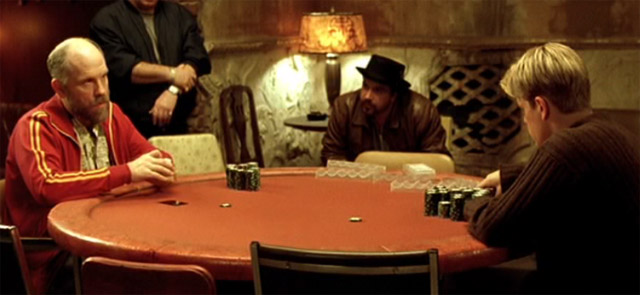
#11. You’re playing too many (or too few) tables at once
Our playing time is limited, as those with spouses and children can attest to, so there is often an incentive to add as many online poker tables as possible in order to play more during any given period. However, if you’re forcing things and reach the point where you are struggling to keep up, your poker game will deteriorate.
When you might need to add a table
If you thought that you are in the clear because you only play one table at a time, think again. Playing too few tables can also adversely affect your game because you will get bored with the slow pace and the distractions that I’ve mentioned earlier will creep up.
Personal example: I used to keep a web browser open along with 1-2 tables to keep myself entertained in between hands and (theoretically) stop myself from playing hands I shouldn’t out of monotony. A friend of mine who has played poker for 60 years and moved online would keep Solitaire open. For me, it was leveling up my AdventureQuest character (yes, seriously, but don’t make me admit it again). The problem arises when you’re folding a hand hastily to get back to your web browser.
The balanced number
Finding a good balance is the key here. You want to play just enough online poker tables where you remain focused, but not so many that you start getting confused about what’s going on. It takes some time to figure what is the right number for you and as you play more you will be able to add more tables.
If you’re just learning poker you definitely want to focus on a single table. Try studying how your opponents are playing and actually guessing a hand range for them even when you aren’t still in the hand. One of the best feelings in poker is pin-pointing what your opponent has and then actually being exactly right.
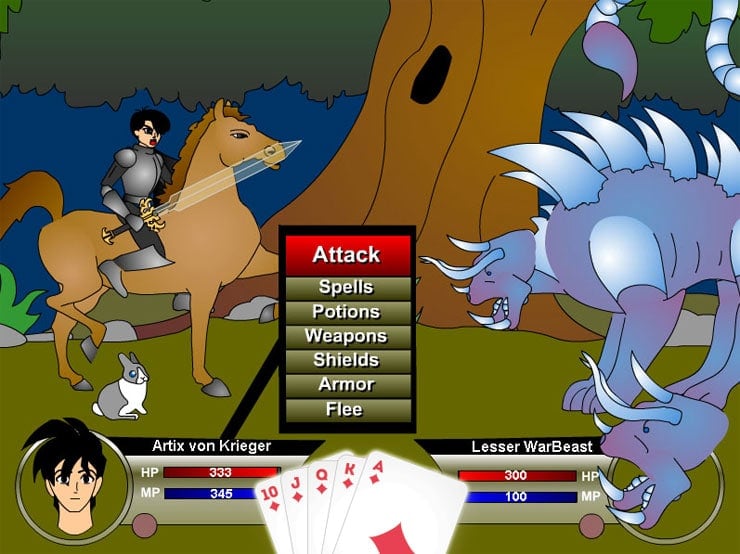
Still not sure why you’re losing money at online poker?
If you’re still uncertain as to why you are losing at online poker, then there are two possibilities. Either none of these reason apply or it is a combination of few of them.
The most likely scenario is that there are bits of pieces of many of these reasons affecting your game without you even noticing it.
For example, maybe you usually don’t play for too long, but every now and then you stay at the tables longer then you should. Even though you try to avoid distractions, from time to time you will check your Facebook feed in another window, or you sometimes play when you aren’t really into it mentally.
Don’t get discouraged by short-term results
Transforming into a winner at online poker is a long process that takes a lot of hard work. Hopefully these guidelines will give you at least a starting point to start looking for correctable leaks in your game.
Don’t get discouraged if it seems hard at first. The more conscious effort you put into fixing your online poker game, the better results will be. Eventually, you won’t be asking yourself, “Why am I losing at online poker?” Instead, you’ll be figuring out ways to win even more.
- The vast majority of online poker players are losers
- You aren’t choosing tables with weaker players
- You don’t know pot odds or probabilities well enough
- Overall player quality has improved significantly since the mid-2000s
- You may not be good enough in basic poker fundamentals
- You’re likely distracted by everything else you can do online in-between hands
- You often play for too long or at too many tables
- You take too many shots above your comfort playing level
- One consistent leak is enough to make you into a losing online poker player
BTF team member Ivan Potocki also contributed to this feature.
Follow Beat The Fish on Facebook and Twitter for the most important poker news story of the day and more mega-guides like this one right in your feed.
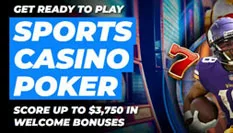
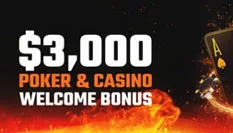








:lol: Some good stuff here. are you sure about a concrete stopping time though. I’ve read a lot of pros talk about how even if you’re losing you should stay at the table if you’re up against bad players.
I’ve heard the same advice and, in theory, it’s correct that you shouldn’t stop playing if you have a skill advantage. You only maintain that advantage, however, if you can stay off tilt and play the same game as you would have if you were winning. Most of us have a tough time doing that, especially if you’ve been on a recent losing streak or suffered a really brutal beat.
If you’re emotional inside you probably don’t have the skill advantage you think you do, even against below-average players.
Sometimes I do everything right and still lose thanks to idiots hitting a draw on me. Advice?
One of the biggest frustrations in poker, although a necessary part. If there wasn’t a chance on any given hand for any player to win why would any beginner ever sit down? Although the skill element far outweighs the luck element, especially in the long run, bad beats are simply part of the game.
It might be tough to deal with, but something that helped me when I first started playing was to realize that if I was being drawn out on it usually meant I was making the right decisions. If you had the better hand when the money went in how can you fault yourself?
That variance is why you try to over-bankroll yourself.
Nice guide, some good tips. I’ve been guilty of plenty of these leaks over the years.
I think that every online poker player has at some point, which is simply human nature. The goal is minimizing them, but it’s probably unrealistic to think we can eliminate every single one of them permanently. We’re human, but we can make good decisions the majority of the time. That’s the key.
Things like rush and zoom poker can eliminate the dumb moves made out of boredom in between hands.
Absolutely – I touched on that a little bit in the article. I love quick-fold games, but the only problem is they’ve gotten increasingly tougher to crack since they first debuted years ago. You don’t get bored, but neither does anyone else, so you run into blinds often and the action is very tough to come by.